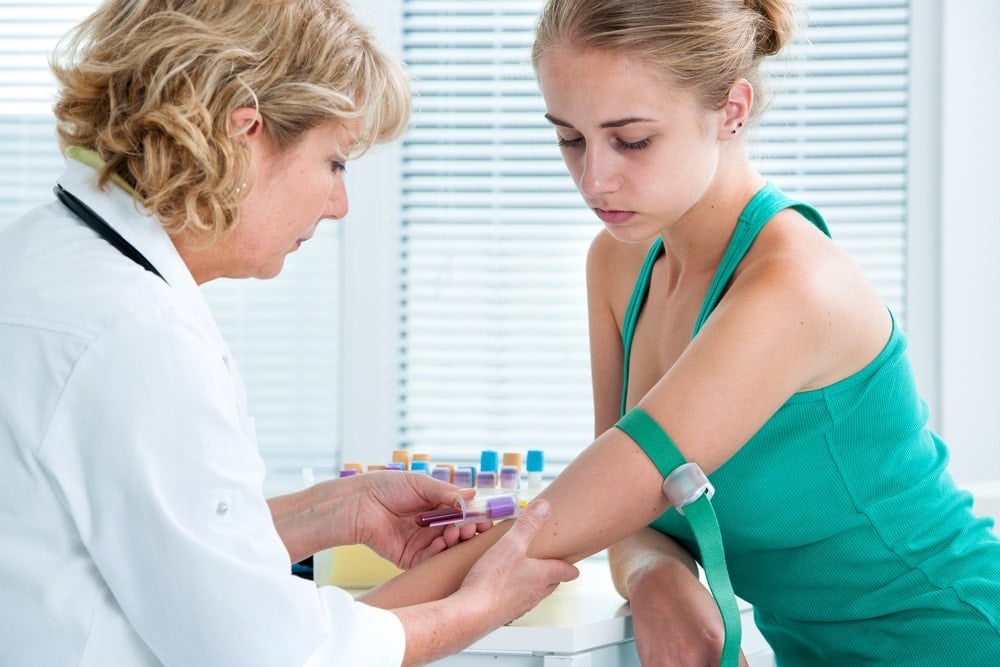The First-Trimester Screening is an early optional non-invasive evaluation that combines a maternal blood screening test with an ultrasound evaluation of the fetus to identify risks for specific chromosomal abnormalities, including Down Syndrome Trisomy-21 and Trisomy-18.
In addition to screening for these abnormalities, a portion of the test (known as the nuchal translucency) can assist in identifying other significant fetal abnormalities, such as cardiac disorders. The screening test does not detect neural tube defects.
What is a first trimester screening test?
It is very important to remember what a screening test is before getting one performed. This will help alleviate some of the anxiety that can accompany test results. Screening tests do not look only at results from the blood test. They compare a number of different factors (including age, ethnicity, results from blood tests, etc…) and then estimate what a person’s chances are of having an abnormality.
These tests DO NOT diagnose a problem; they only signal further testing should be done.
How is the first-trimester screen performed?
The blood screen involves drawing blood from the mother, which takes about 5 to 10 minutes. The blood sample is then sent to the laboratory for testing. The ultrasound is performed by an ultrasound specialist or perinatologist and takes between 20 and 40 minutes. The results are evaluated within a week of the testing.
What are the risks and side effects to the mother or baby?
Except for the discomfort of drawing blood, there are no known risks or side effects associated with the First Trimester screen. There is a 5% false-positive rate for the test. Parents should be aware of the possibility of receiving abnormal results and then finding, after further testing, the baby is normal.
Why you might consider this test
One advantage to having First Trimester Screening is that you will have information about your risk for Down syndrome and trisomy 18 earlier in the pregnancy than you would with the standard Maternal Serum Screening. While both First Trimester and Maternal Serum Screening can test for Down syndrome and trisomy 18, Maternal Serum Screening can also test for neural tube defects.
When is the first-trimester screen performed?
The First Trimester Screen is performed between the 11th and 13th week of pregnancy. Because the test is performed so early, it is often used to determine whether a mother should consider undergoing an early (first-trimester) diagnostic test, such as chorionic villus sampling, or second-trimester amniocentesis.
What does the first-trimester screen look for?
In babies who are at an increased risk for chromosomal abnormalities, increased fluid is often found in the nuchal translucency. Abnormally high or low hCG and PAPP-A levels are also often found. The first-trimester screen combines the results from these three measurements (nuchal translucency, hCG, and PAPP-A) with maternal age risk factors and determines an overall risk factor for chromosomal abnormalities.
What do the results mean?
It is important to remember the first-trimester screen is a screening test and not a diagnostic test. This test only notes a mother is at risk of carrying a baby with a genetic disorder. Many women who experience an abnormal test discover later the test proved false.
You will not be given specific quantitative values for the separate parts of the First Trimester screen. Instead, you will be told whether your results are “normal or abnormal”, and you will be given a risk level by your genetic counselor. The counselor will give you your risk factor for chromosomal abnormalities based on the test results (for example 1/250, 1/1300).
Abnormal test results warrant additional testing for making a diagnosis. Your genetic counselor will discuss the results with you and assist you in deciding about diagnostic tests, such as CVS or amniocentesis. These invasive procedures should be discussed thoroughly with your healthcare provider and between you and your partner. Additional counseling may prove helpful.
What are the reasons for further testing?
First Trimester Screening will help find about 84 percent, or 5 out of every 6, babies with Down syndrome, and about 80 percent, or 4 out of every 5, babies with trisomy 18.
- Down syndrome, also called trisomy 21, is caused by an extra chromosome in the developing baby. It causes mental retardation and serious heart problems. One baby out of every 600 is born with Down syndrome. Although having a baby with Down syndrome occurs more often to women who are older, it can happen at any age.
- Trisomy 18 is caused by an extra chromosome in the developing baby. Few babies with trisomy 18 survive to birth. One baby in every 6,000 is born with trisomy 18. Trisomy 18 causes mental retardation, heart defects, very poor growth, and other problems.
Performing further testing allows you to confirm a diagnosis and then provides you with certain opportunities:
- Pursue potential interventions that may exist (i.e. fetal surgery for spina bifida)
- Begin planning for a child with special needs
- Start addressing anticipated lifestyle changes
- Identify support groups and resources
- Make a decision about carrying the child to term
Some individuals or couples may elect not to pursue testing or additional testing for various reasons:
- They are comfortable with the results no matter what the outcome
- Because of personal, moral, or religious reasons, making a decision about carrying the child to term is not an option
- Some parents choose not to allow any testing that poses any risk of harming the developing baby
- It is important to discuss the risks and benefits of testing thoroughly with your healthcare provider. Your healthcare provider will help you evaluate if the benefits from the results could outweigh any risks from the procedure.
Want to Know More?
Compiled using information from the following sources:
- Dartmouth-Hitchcock Obstetrics
- New England Journal of Medicine, Volume 349, Number 15, October 2003, First-Trimester Screening for Trisomies21 and 18
- National Down Syndrome Society
- Nemours Foundation






